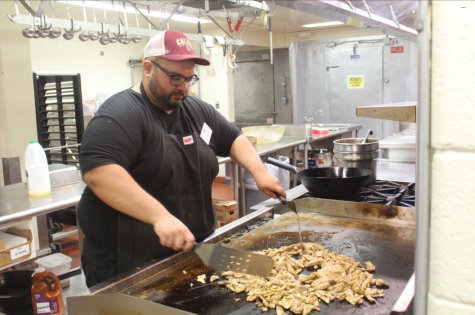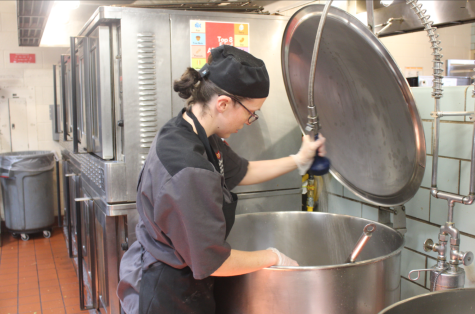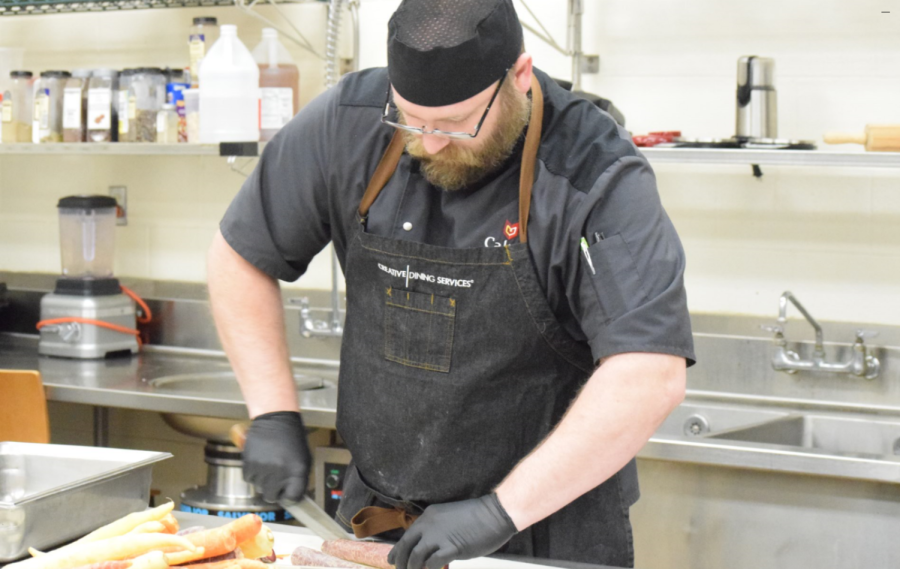Behind the scenes with Calvin’s chefs
Not only is Chef Hartman executive chef at Prince Conference Center, but he also oversees catering at events held at the center.
Every day, hundreds of students go to the dining halls to enjoy fried rice from Kimchi or a burrito from the Taqueria line. However, not many students know who’s behind the kitchen doors and hardly any of them know of the time, effort and preparation that went into their meal. Chimes sat down with Production Sous Chef of Commons Carlos Mendoza, Sous Chef of Knollcrest Kari Dewent and Executive Chef of Catering at Prince Conference Center Ryan Hartman, to get an inside look at Calvin’s kitchens.
Chimes: What led you to become a chef for a living?
Chef Mendoza: I had always enjoyed being in the kitchen from a young age and watching cooking shows as they gained popularity from the 90’s into the 00’s. Two of my biggest hobbies are traveling and being able to experience other cultures through food. I worked several internships as an engineering intern while in college and ultimately decided to switch my major to culinary arts.
Chef Dewent: From my great aunt and great grandmother. They were great home cooks and bakers!
Chef Hartman: Growing up, I thought my mother was a terrible cook. I started watching “Master Chefs of the World” on NOVA and cooking for myself at 10. Making my meals was a challenge at first but I enjoyed working with my hands and I’ve never stopped.

Chimes: Walk us through a standard day in the kitchen. Do you have a set routine for each day?
Chef Mendoza: My main focus when arriving is making sure the kitchen is set up for success during lunch service. I like to be involved in all aspects from prep to cooking for the lines and delegating responsibilities. Almost all prep is done a day or two in advance so in the morning we can focus on cooking the food for the lunch stations. Once lunch is complete, I focus on writing future menus, prep sheets and ordering.
Chef Dewent: First I check the menu for that day’s meals. I talk with the other cooks on what we are going to cook that day. Then we get started on preparing each dish. Continuously throughout the day we prep food for the next day. Then at the end of my shift I clean up the equipment I used, clean the prep tables and that is my day.
Chef Hartman: The day starts early over coffee, around 4:00 – 4:30 a.m. I review staff schedules, events, timelines and any last minute changes. I typically spend half of my on-site time in the kitchen teaching or training the staff and overseeing event execution. I try to stick to a set routine for my administrative work and meetings but my day is centered around the functions of the day.

Chimes: What is your favorite part about being a chef on Calvin’s campus? What is the hardest part?
Chef Mendoza: One of the most challenging aspects of my job is overseeing and writing the menu for Kimchi. Most of my cooking experience has been working in kitchens that follow classic French technique and European styles of dishes. However, I enjoy getting feedback and new ideas from students, and having the opportunity to research and learn about ingredients and cooking techniques.
Chef Dewent: My favorite part would be working with the student employees.
Chef Hartman: What I enjoy most in my role on campus is providing a vehicle for people to come together and exchange ideas. Dining has become very impersonal with the hustle of life. I get to assist in some of that slowing down most of us crave. The hardest aspect of working in my role is self-care. I find it hard to slow down and relax. I’ve come up in the kitchen with the mantra “if you have time to lean, you have time to clean.” It’s never left my habits even as my role has changed throughout my career.
Chimes: What’s one thing you wish students knew about your job or what happens in the kitchens?
Chef Mendoza: From cooking to service and cleaning, the operations of Dining Services is a big undertaking. I am very grateful for the hard work that is put in by our student staff! They spend many hours on tasks such as cutting fresh meats and vegetables so we can offer a wide variety of healthier options, and without service staff and cleaners, we wouldn’t be able to do special events such as sushi day and late-night breakfast.
Chef Dewent: We are always working hard to make sure the Calvin students enjoy our food and we do appreciate hearing feedback on how the meals were.
Chef Hartman: It is nothing like what is portrayed on TV. We are craftsmen and craftswomen, not artists. We continually repeat tasks honing skills until we rarely get it wrong. It takes many years to build up a knowledge base and repertoire to succeed in the various tasks we perform.
Chimes: There are some students who want to cook their own meals, but are afraid they don’t have the time and budget to do so. Do you have any ideas for ways students can make easy and affordable meals when on a time crunch and on a budget?
Chef Mendoza: I have become a big fan of utility kitchen gadgets over the last few years. Recently one of my favorite items has become my air fryer. There are many great “hacks” you can find on social media for recipes that minimize cooking time and clean up when you are looking for a quick meal as an alternative to frozen foods that are costly and loaded with preservatives. Another item I use often is my Instapot. Soups and stews that normally can take hours can be done in 30-40 minutes. This makes for an inexpensive way to cook for several people or meal prep a dish that can be eaten over several days.
Chef Dewent: Pre-cook chicken, and/or ground beef. You can season them with taco seasoning or just salt and pepper and garlic. They can be frozen or kept in the refrigerator. Then when needed, you can turn them into spaghetti, tacos, or mix them with rice, vegetables, etc. Rice, pasta and quinoa are great accompaniments to a meal. You can buy them in bulk and you get a lot of meals out of it. Cook them ahead of time so they can be grabbed when needed. You can mix them with precooked chicken and/or precooked ground beef or your favorite mixed vegetable.
Chef Hartman: When making meals at home, it generally boils down to time or money. You spend in one area to save in the other. Keep to simple recipes. Buy from stores that offer “by weight” sales allowing you to spend only what you need. Make sauces and condiments in bulk and store extras for time savers.



